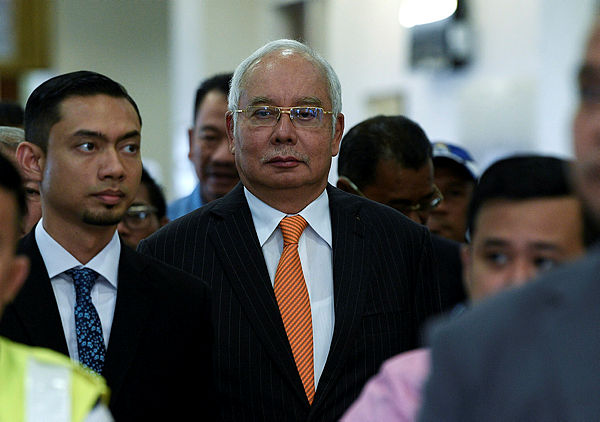KUALA LUMPUR: The High Court here today ruled that former prime minister Datuk Seri Najib Abdul Razak had used his office or position for gratification and had utilised RM42 million of SRC International Sdn Bhd’s funds, in which he had an interest, for his personal interest and own advantage.
Justice Mohd Nazlan Mohd Ghazali said the intention to obtain gratification in the case could be easily inferred from the circumstances, given the failure of the accused to avoid a conflict of interest or position at Cabinet meetings, supplying the criminal intention against him.
He said it is particularly when it has already been shown that the accused had an interest in SRC which he also controlled, the entity which was the subject matter of the decision to grant the government guarantees at the Cabinet meetings which made the loans to SRC possible.
The government guarantees had been approved in two stages of RM2 billion each.
“Given the accused’s control over SRC, the accused could cause the transfers of the company’s funds as happened in respect of the three transactions totalling RM42 million which, through intermediary companies, were credited into his personal accounts at Ambank and eventually utilised and expended to his own advantage.
“This is a gratification to the accused pure and simple,” the judge said in the packed courtroom.
The judge emphasised that when considering the law under Section 23 of the Malaysian Anti-Corruption Commission (MACC) Act 2009 and the charge preferred against the accused under the offence, the factual matrix must be properly appreciated and the evidence must be viewed in totality.
He said the interest of the accused in SRC must be seen in the correct context, which was from the time of the establishment of SRC on Jan 7, 2011, to the approval of the applications for loans by SRC from the Retirement Fund Incorporated (KWAP) on July 19, 2011, and March 20 2012.
Justice Mohd Nazlan said the first loan was approved by the Cabinet on Aug 17, 2011, and the second on Feb 8, 2012, totalling RM4 billion until the time the monies, being the property of SRC of RM42 million, were deposited into the accused’s bank accounts which evidence would also demonstrate that it was eventually used by the accused for his personal interest and own advantage.
“The accused’s participation in the Cabinet meetings in 2011 and 2012 was the act which amounts to the abuse of position which was for the purposes of obtaining financial gratification, which materialised when the RM42 million was received by him in late 2014 and early 2015,” he said.
The judge said it has been shown that the accused participated in the decision-making process at the meetings of the Cabinet which the accused chaired when the two government guarantees for the loan from KWAP to SRC were approved.
He said this clearly was a decision or action, at least on two occasions, taken by the accused in relation to government guarantees of the SRC’s loans in which the accused had an interest of a nature that was caught under Section 23 of the MACC Act.
“In fact, the accused himself as the prime minister who chaired the meetings had tabled a Cabinet paper on the second government guarantee at the meeting which approved the same on Feb 8, 2012. There was no disclosure, let alone any attempt to excuse himself from the deliberation on the Cabinet paper at the either of the said meetings.
“The said RM4 billion loans would not have been approved by KWAP Investment Panel if not for the government guarantees,” he said.
The judge said the accused knew or ought certainly to have known of the conflict between his public duty as the prime minister and finance minister on the one hand and his own private albeit secret interest in SRC.
He said the loans would not have been approved without the government guarantees and early disbursement of the loans would not have been possible if the accused was not the prime minister or finance minister at the time.
The judge said the evidence showed that the SRC was not just like any other MOF Inc companies, as unlike most others, SRC was under the control and direction of the accused from day one.
“Even upon the incorporation of SRC and before 1Malaysia Development Berhad (1MDB) and MOF Inc became the shareholder of SRC, the accused already wielded considerable powers in SRC in view of Article 67 and 116 of the articles of association of the company which conferred on the accused as the PM the authority on the appointment and removal of directors, as well as any amendment to the memorandum and articles of association (M&A) of SRC,” he said.
The accused had, in his capacity as the sole shareholder of MOF Inc, later moved to further solidify his controlling position by causing the insertion of Article 117, making the prime minister the advisor emeritus of SRC, whose advice must be sought on key matters, which allowed him to exercise his control over SRC, the judge said.
“The overarching powers in M&A and as its sole shareholder had the effect of making the accused the ultimate decision-maker in SRC where nothing of importance could be decided by SRC without the input of the accused,” he said
In conclusion, Justice Mohd Nazlan said upon a maximum evaluation of all evidence adduced before him at the end of the prosecution stage, the court found that the prosecution had successfully adduced credible evidence under offences of abuse of position for gratification.
“A prima facie case has therefore been made out against the accused. As such, I now call upon the accused to enter his defence on the offence,” he said.
On one charge of abusing his position, Najib, as prime minister and minister of finance, allegedly used his position to commit bribery involving RM42 million through his participation or involvement in the decision to provide government guarantees for loans from the Retirement Fund Incorporated to SRC International amounting to RM4 billion.
He was alleged to have committed the offence at the Prime Minister’s Office, Precinct 1, Putrajaya, between Aug 17, 2011 and Feb 8, 2012.
The charge, under Section 23 of the MACC Act 2009 and punishable under Section 24 of the same Act, provides an imprisonment for up to 20 years and a fine of not less than five times the amount or value of the bribe or RM10,000, whichever is higher, upon conviction. — Bernama













